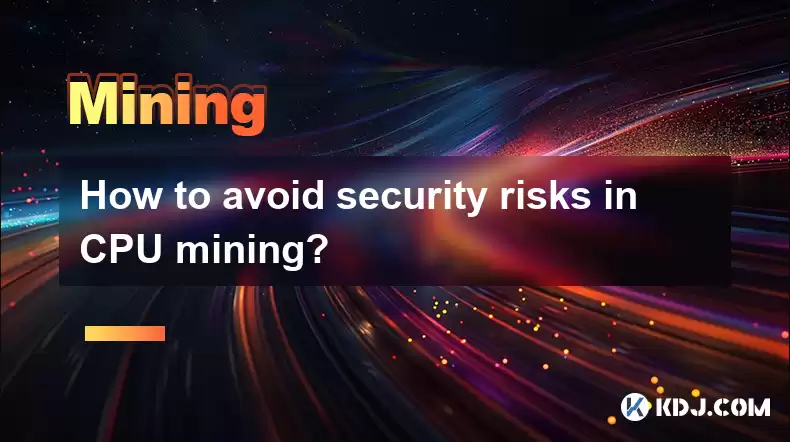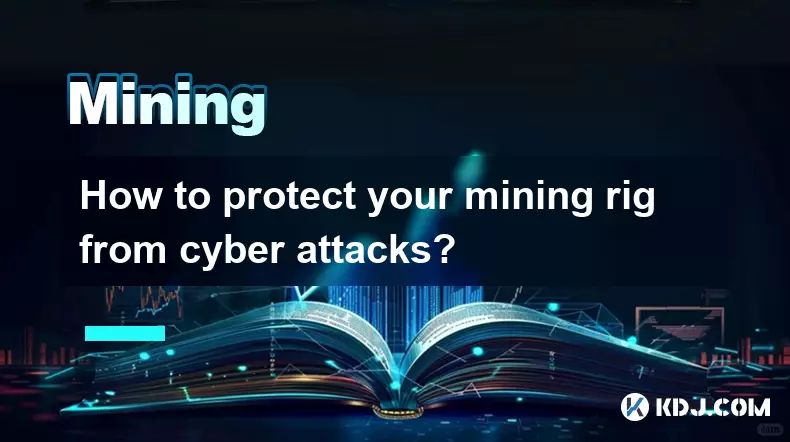-
 bitcoin
bitcoin $87959.907984 USD
1.34% -
 ethereum
ethereum $2920.497338 USD
3.04% -
 tether
tether $0.999775 USD
0.00% -
 xrp
xrp $2.237324 USD
8.12% -
 bnb
bnb $860.243768 USD
0.90% -
 solana
solana $138.089498 USD
5.43% -
 usd-coin
usd-coin $0.999807 USD
0.01% -
 tron
tron $0.272801 USD
-1.53% -
 dogecoin
dogecoin $0.150904 USD
2.96% -
 cardano
cardano $0.421635 USD
1.97% -
 hyperliquid
hyperliquid $32.152445 USD
2.23% -
 bitcoin-cash
bitcoin-cash $533.301069 USD
-1.94% -
 chainlink
chainlink $12.953417 USD
2.68% -
 unus-sed-leo
unus-sed-leo $9.535951 USD
0.73% -
 zcash
zcash $521.483386 USD
-2.87%
How to avoid security risks in CPU mining?
Secure CPU mining requires robust security practices: use reputable software, strong passwords, 2FA, regular updates, and diversify your mining & wallet holdings to mitigate risks of malware and theft.
Mar 04, 2025 at 01:06 pm

- Understanding CPU mining's inherent vulnerabilities.
- Choosing secure mining software and hardware.
- Protecting your system from malware and viruses.
- Securing your cryptocurrency wallets.
- Utilizing strong passwords and two-factor authentication.
- Regularly updating your system software and security protocols.
- Diversifying your mining activities to reduce risk.
CPU mining, while accessible, presents unique security challenges. Unlike ASIC or GPU mining, the lower profitability means miners are often less vigilant about security. This increased vulnerability makes it crucial to understand and mitigate the risks involved. Neglecting security can lead to the loss of your mined cryptocurrency or even compromise your entire system.
Understanding the Risks:CPU mining, due to its lower hash rate, is often targeted less by large-scale attacks. However, individual miners are still vulnerable to several threats. Malware can steal your mined coins, keyloggers can capture your passwords, and poorly secured software can leave your system open to exploitation.
Choosing Secure Mining Software and Hardware:Selecting reputable mining software is paramount. Research thoroughly before installing any software, checking reviews and community feedback. Avoid downloading from untrusted sources. Ensure your operating system and antivirus software are up-to-date. Regularly scan your system for malware. Consider using a dedicated, less-important computer for mining to minimize the impact of a potential compromise.
Protecting Your System from Malware and Viruses:Malware specifically designed to target miners is a significant threat. This malware can redirect your mining efforts to the attacker's wallet, effectively stealing your earnings. A robust antivirus program with real-time protection is crucial. Regular system scans are essential, and keeping your software updated patches vulnerabilities that malware could exploit.
Securing Your Cryptocurrency Wallets:Your cryptocurrency wallet is the ultimate target. Use strong, unique passwords for each wallet and avoid reusing passwords across different platforms. Enable two-factor authentication (2FA) whenever possible, adding an extra layer of security. Consider using hardware wallets for enhanced security, especially for larger amounts of cryptocurrency. Never share your wallet seed phrase with anyone.
Utilizing Strong Passwords and Two-Factor Authentication:Strong passwords are essential, using a combination of uppercase and lowercase letters, numbers, and symbols. Password managers can help generate and securely store complex passwords. Two-factor authentication (2FA) adds an extra layer of security by requiring a second verification method, such as a code sent to your phone or email. This makes it significantly harder for attackers to access your accounts even if they obtain your password.
Regularly Updating Your System Software and Security Protocols:Regularly updating your operating system, antivirus software, and mining software is crucial. Updates often include security patches that address newly discovered vulnerabilities. Ignoring these updates leaves your system exposed to potential attacks. Keeping your software current is a simple yet highly effective security measure.
Diversifying Your Mining Activities:Don't put all your eggs in one basket. Diversify your mining activities across different pools and algorithms. This reduces your reliance on a single platform and mitigates the risk of a single point of failure. If one pool is compromised, your other mining operations will remain unaffected. Spread your cryptocurrency holdings across multiple wallets to further limit potential losses.
Common Questions:Q: Is CPU mining inherently less secure than GPU or ASIC mining?A: Not necessarily less secure in terms of inherent vulnerability, but often perceived as less secure due to lower profitability. Miners may be less inclined to invest in robust security measures when returns are smaller. The security risks are similar, just the motivation to secure the operation may be lower.
Q: Can I use a virtual machine (VM) for CPU mining to enhance security?A: Using a VM can offer some isolation, but it's not a foolproof solution. If the host system is compromised, the VM might still be vulnerable. It provides a layer of separation, but it's not a replacement for robust security practices.
Q: What is the best antivirus software for CPU miners?A: There's no single "best" antivirus, as effectiveness depends on various factors. Popular options include Bitdefender, Kaspersky, Norton, and Malwarebytes. Choose a reputable antivirus with real-time protection and regularly update it.
Q: How often should I update my mining software and operating system?A: Update your mining software and operating system as soon as updates are released. Check for updates regularly, ideally at least weekly, to ensure you have the latest security patches.
Q: What should I do if I suspect my system has been compromised?A: Immediately disconnect your computer from the internet to prevent further damage. Run a full system scan with your antivirus software. Change all your passwords, especially those related to your cryptocurrency wallets. Consider seeking professional help from a cybersecurity expert.
Disclaimer:info@kdj.com
The information provided is not trading advice. kdj.com does not assume any responsibility for any investments made based on the information provided in this article. Cryptocurrencies are highly volatile and it is highly recommended that you invest with caution after thorough research!
If you believe that the content used on this website infringes your copyright, please contact us immediately (info@kdj.com) and we will delete it promptly.
- Bitcoin Blunder: Crypto Firm Bithumb's Massive Mistaken Transfer Sparks User Compensation and Regulatory Scrutiny
- 2026-02-08 07:35:01
- Ripple's XRP Ledger Set to Revolutionize Finance with Lending Protocols and Confidential Transactions
- 2026-02-08 07:20:02
- Bitcoin's Taker Ratio Signals Deep Bearish Sentiment Amidst Market Turmoil
- 2026-02-08 07:35:01
- KDN Fuels Klardven's DeFi Ascent: Demand Soars, FOMO Follows in a Maturing Market
- 2026-02-08 07:20:02
- Coinbase Liquidations Jolt Crypto Loan Market: A Systemic Shock on the Horizon?
- 2026-02-08 07:15:01
- Big Game Buzz: BetMGM Bonus & COVERS Unlock Massive Coin Toss Wagers
- 2026-02-08 07:15:01
Related knowledge

How to mine crypto sustainably in 2026?
Feb 07,2026 at 04:20pm
Energy Source Optimization1. Miners increasingly deploy solar arrays directly on warehouse rooftops to power ASIC rigs during daylight hours. 2. Geoth...

How to mine Conflux on a standard gaming laptop?
Feb 07,2026 at 04:19am
Hardware Requirements for Conflux Mining1. Conflux uses a proof-of-work consensus mechanism called Tree-Graph, which is designed to be ASIC-resistant ...

How to mine Flux with a 30-series Nvidia GPU?
Feb 07,2026 at 02:40pm
Market Volatility Patterns1. Bitcoin price movements often exhibit sharp intraday swings exceeding 5% during low-liquidity windows, particularly betwe...

How to pay taxes on crypto mining income in 2026?
Feb 07,2026 at 01:20am
Tax Classification of Mining Rewards1. Cryptocurrency received as mining rewards is treated as ordinary income by most major tax jurisdictions includi...

How to find the lowest fee mining pools for BTC?
Feb 07,2026 at 01:00pm
Fee Structure Transparency1. Most reputable BTC mining pools publish their fee schedules directly on their official websites, often under sections lab...

How to protect your mining rig from cyber attacks?
Feb 05,2026 at 09:40pm
Secure Firmware Updates1. Always verify the digital signature of firmware before installation to ensure authenticity and integrity. 2. Disable automat...

How to mine crypto sustainably in 2026?
Feb 07,2026 at 04:20pm
Energy Source Optimization1. Miners increasingly deploy solar arrays directly on warehouse rooftops to power ASIC rigs during daylight hours. 2. Geoth...

How to mine Conflux on a standard gaming laptop?
Feb 07,2026 at 04:19am
Hardware Requirements for Conflux Mining1. Conflux uses a proof-of-work consensus mechanism called Tree-Graph, which is designed to be ASIC-resistant ...

How to mine Flux with a 30-series Nvidia GPU?
Feb 07,2026 at 02:40pm
Market Volatility Patterns1. Bitcoin price movements often exhibit sharp intraday swings exceeding 5% during low-liquidity windows, particularly betwe...

How to pay taxes on crypto mining income in 2026?
Feb 07,2026 at 01:20am
Tax Classification of Mining Rewards1. Cryptocurrency received as mining rewards is treated as ordinary income by most major tax jurisdictions includi...

How to find the lowest fee mining pools for BTC?
Feb 07,2026 at 01:00pm
Fee Structure Transparency1. Most reputable BTC mining pools publish their fee schedules directly on their official websites, often under sections lab...

How to protect your mining rig from cyber attacks?
Feb 05,2026 at 09:40pm
Secure Firmware Updates1. Always verify the digital signature of firmware before installation to ensure authenticity and integrity. 2. Disable automat...
See all articles










































































